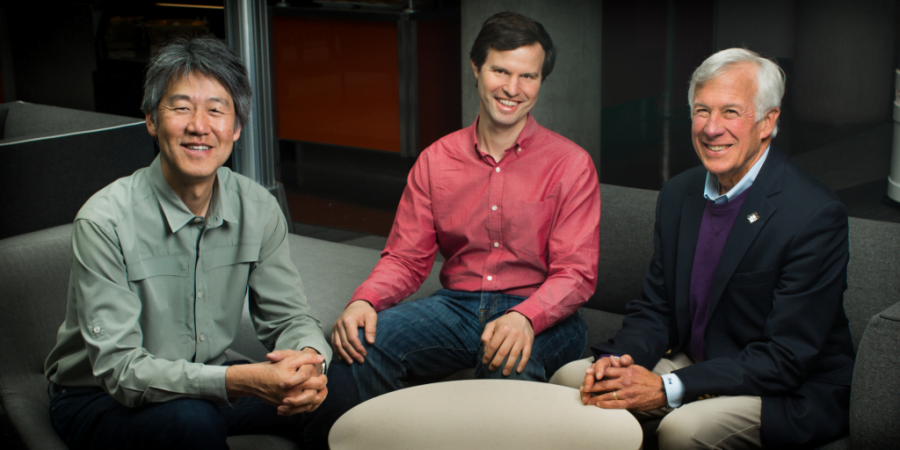It’s an exciting time to be working shoulder-to-shoulder with our healthcare partners and customers, who represent some of the brightest minds in this important industry. We have been approaching the complexities of the healthcare industry with a growth mindset, and for the past two years our team has worked across Microsoft to accelerate healthcare innovation through artificial intelligence and cloud computing, with our initiative Healthcare NExT (New Experiences and Technologies). We shared some updates earlier this year on our work in cloud architectures, empowering clinicians and care teams, and precision medicine, and I’ve been thrilled to see the progress and reaction across the industry.
Today we are building on that progress. I’m very pleased to welcome two prominent experts in the science, technology and practice of value-based healthcare to the team. Jim Weinstein and Josh Mandel will be joining Microsoft Healthcare – which integrates Healthcare NExT and its research-driven efforts – with an added focus of creating strategic partnerships, and driving the cross-company strategy for healthcare and life sciences.
Jim Weinstein, Vice President, Microsoft Healthcare, Head of Innovation and Health Equity
Jim Weinstein will work closely with organizations on the front lines of healthcare delivery as we aim to support health systems, empower clinicians and enable the systems of care as they move to the cloud. He will be my partner in developing the strategic vision for Microsoft Healthcare, and will provide leadership that is grounded in decades of health industry experience. A widely respected visionary, author, surgeon and leader in the future of healthcare delivery who has advised three administrations on healthcare policy, Jim most recently served as CEO and president of Dartmouth-Hitchcock and the Dartmouth-Hitchcock Health system, and is the past director of the Dartmouth Institute, home of the Dartmouth Atlas of Health Care. Jim is also the co-founder and inaugural executive director of the national High Value Healthcare Collaborative, which brings together some of the nation’s top healthcare systems to share data, develop insights and advance the causes of better healthcare outcomes. He recently chaired the “Communities in Action, Pathways to Health Equity” report for the National Academy of Medicine. His book “Unraveled” looks at the broken healthcare system and how it might be repaired with patient-based clinical insights.
Joshua Mandel, Chief Architect, Microsoft Healthcare
Joshua Mandel will work closely with customers, partners and the open standards community to lay the groundwork for an open cloud architecture to unlock the value of healthcare for the entire health ecosystem. As a tireless evangelist for the importance of open standards, Josh will continue his work to help systems across the industry become more agile and interoperable. Josh’s impressive background as a physician and brilliant software architect has set him apart as a leader in the development of next-generation standards for healthcare data interoperability. In his most recent role, Josh led the health IT ecosystem work at Verily (Google Life Sciences). He is a member of the research faculty at the Boston Children’s Hospital Computational Health Informatics Program where he served as lead architect for SMART Health IT, and is a visiting scientist at the Harvard Medical School Department of Biomedical Informatics. Josh earned his bachelor of science degree in electrical engineering and computer science from Massachusetts Institute of Technology, and his M.D. from Tufts University of Medicine.
Jim and Josh join us at an exciting time, as healthcare processes undergo a digital transformation. This transformation has created a wealth of healthcare data that has potential to help identify diseases earlier, create and improve treatments and improve the lives of patients across the globe. Unfortunately, even with advances in data protection and governance, healthcare data is not easily accessible by the researchers and doctors who need it to help us all realize the potential. And so, for a variety of regulatory, technological and political reasons, we see what is called the “health data funnel,” which holds back the case of scalable innovation in healthcare.
At Microsoft, we’re confident that many aspects of the IT foundations for healthcare will move from on-premise doctors’ offices and clinics to live in the cloud. We ask the questions: Can we take advantage of this huge sea change in healthcare to unlock the innovation potential in healthcare data? Can we work as a community to ensure that we don’t simply re-create the same data silos that we have today?
We think that together, we can solve these problems. We are taking concrete steps with an initial “blueprint” intended to standardize the process for the compliant, privacy-preserving movement of a patient’s personal health information to the cloud and the automated tracking of its exposure to machine learning and data science, for example to support external audit. This is a small first step, but progress toward an open architecture that ultimately will benefit doctors, nurses and clinicians in how they interact with patients, and also allow more time for patients to spend face-to-face with their care providers. It also opens up research opportunities for this data to be shared, and to be done under the same compliance and regulatory standards which protect your health data today; all with the goal of leading to advancements in medical science.
We have our work cut out for us but know that we have the right team in place. We’re looking forward to sharing more later this year about what we’re doing to help unlock the power of healthcare data and create opportunities for the entire health ecosystem.






